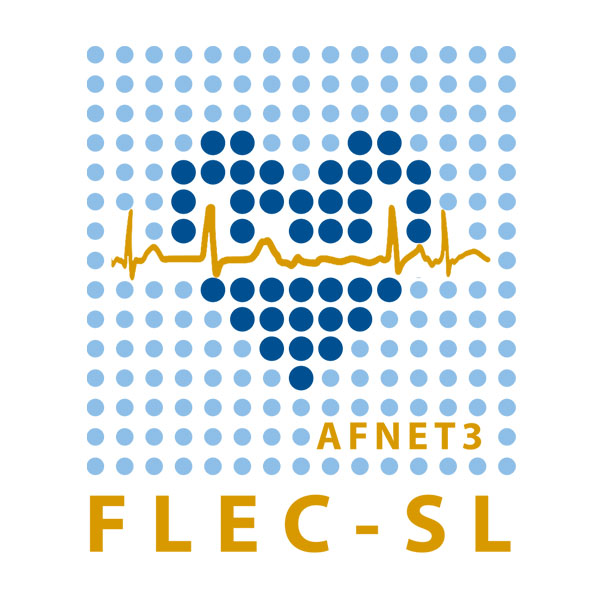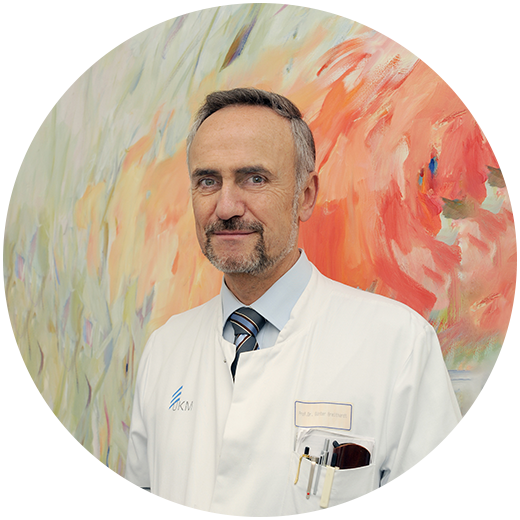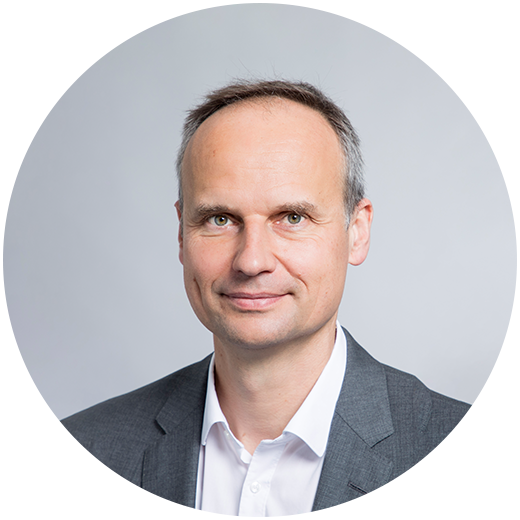
Flec-SL-AFNET 3
Targeted Pharmacological Reversal of Electrical Remodeling After Cardioversion.
Study design
Prospective, randomized, controlled, open label, parallel group multi-center investigator-initiated trial.

Inclusion Criteria
![]() Documented persistent atrial fibrillation
Documented persistent atrial fibrillation
![]() Age of 18 years
Age of 18 years
![]() Documented oral anticoagulation (INR ≥ 2) for at least three weeks prior to inclusion, or exclusion of left atrial thrombi by trans-esophageal echocardiography
Documented oral anticoagulation (INR ≥ 2) for at least three weeks prior to inclusion, or exclusion of left atrial thrombi by trans-esophageal echocardiography
![]() Written informed consent of the patient
Written informed consent of the patient
Exclusion Criteria
![]() Current therapy with antiarrhythmic agents of class I and class III other than study medication flecainide. Such antiarrhythmic treatment must be stopped five half lives prior to enrolment. Five half-lives correspond to 48 hours for almost all antiarrhythmic agents. For details regarding a specific agent, this information can be obtained through the internet at www.rote-liste.de or from the information of the specific compound.
Current therapy with antiarrhythmic agents of class I and class III other than study medication flecainide. Such antiarrhythmic treatment must be stopped five half lives prior to enrolment. Five half-lives correspond to 48 hours for almost all antiarrhythmic agents. For details regarding a specific agent, this information can be obtained through the internet at www.rote-liste.de or from the information of the specific compound.
![]() Long-term therapy with amiodarone within the last 6 months prior to inclusion
Long-term therapy with amiodarone within the last 6 months prior to inclusion
![]() Symptomatic bradycardia or symptomatic sick sinus syndrome unless treated with a permanent pacemaker
Symptomatic bradycardia or symptomatic sick sinus syndrome unless treated with a permanent pacemaker
![]() Symptomatic higher degree AV nodal block (grade II or III) unless treated with a permanent pacemaker
Symptomatic higher degree AV nodal block (grade II or III) unless treated with a permanent pacemaker
![]() Brugada syndrome
Brugada syndrome
![]() Typical angina pectoris symptoms at rest or during exercise
Typical angina pectoris symptoms at rest or during exercise
![]() Known untreated coronary artery disease with high-degree coronary stenosis (> 80% reduction in luminal diameter)
Known untreated coronary artery disease with high-degree coronary stenosis (> 80% reduction in luminal diameter)
![]() Myocardial infarction within the last 3 months
Myocardial infarction within the last 3 months
![]() Left ventricular ejection fraction of more than 40%
Left ventricular ejection fraction of more than 40%
![]() Creatinine clearance < 50 ml/min*1.73 m2 as determined by the Cockroft-Gould formula. The digital data management system will calculate this value for you during the inclusion process. For completeness of documentation, the formula is given below:
Creatinine clearance < 50 ml/min*1.73 m2 as determined by the Cockroft-Gould formula. The digital data management system will calculate this value for you during the inclusion process. For completeness of documentation, the formula is given below:
![]() Men: Creatinine clearance (ml/min) = (140 – age(years)) * body weight (kg) / (72 * serum creatinine level (mg/dl))
Men: Creatinine clearance (ml/min) = (140 – age(years)) * body weight (kg) / (72 * serum creatinine level (mg/dl))
![]() Women: Value for men * 0,85
Women: Value for men * 0,85
![]() Manifest hepatic insufficiency
Manifest hepatic insufficiency
![]() Hyperthyroidism or hypothyroidism manifested clinically and in laboratory tests (TSH, T3, T4)
Hyperthyroidism or hypothyroidism manifested clinically and in laboratory tests (TSH, T3, T4)
![]() Females who are pregnant or breast feeding
Females who are pregnant or breast feeding
![]() Females of childbearing potential who are not using a scientifically accepted method of contraception
Females of childbearing potential who are not using a scientifically accepted method of contraception
![]() Participation in a clinical trial within the last 30 days. Simultaneous participation in a registry (e.g. project AB1 of the AFNET) is permitted.
Participation in a clinical trial within the last 30 days. Simultaneous participation in a registry (e.g. project AB1 of the AFNET) is permitted.
![]() Drug addiction or chronic alcohol abuse
Drug addiction or chronic alcohol abuse
![]() Legal incapacity, or other circumstances which would prevent the patient from understanding the aim, nature or extent of the clinical trial
Legal incapacity, or other circumstances which would prevent the patient from understanding the aim, nature or extent of the clinical trial
![]() Evidence of an uncooperative attitude
Evidence of an uncooperative attitude
![]() Prolongation of the QRS complex by more than 25% during flecainide treatment (measured as the difference in QRS duration between the baseline ECG and the ECG at cardioversion (34))
Prolongation of the QRS complex by more than 25% during flecainide treatment (measured as the difference in QRS duration between the baseline ECG and the ECG at cardioversion (34))
hypothesis
Targeted “pharmacological reversal” of atrial remodeling by short-term administration of action potential prolonging antiarrhythmic drugs (4 weeks therapy duration) is equally efficient and potentially safer to prevent recurrent AF after cardioversion when compared to current long-term antiarrhythmic drug therapy.
Conclusion
Short-term treatment with antiarrhythmic drugs after cardioversion is less effective than long-term treatment but can prevent most recurrences of atrial fibrillation.
PATIENTS
STUDY sites
Study duration
Start of study
2005
End of study
2011
Study information for download
Publications
Oto E, Okutucu S, Katircioglu-Öztürk D, Altay Güvenir H, Karaagaoglu E, Borggrefe M, Breithardt G, Goette A, Ravens U, Steinbeck G, Wegscheider K, Oto A, Kirchhof P. Predictors of sinus rhythm after electrical cardioversion of atrial fibrillation: results from a data mining project on the Flec-SL trial data set. Europace. 2017 Jun 1; 19 (6):921 – 928. pii: euw144. doi:10.1093/europace/euw144 . Epub 2016 Jul 2
Apostolakis S, Haeusler KG, Oeff M, Treszl A, Andresen D, Borggrefe M, Lip GY, Meinertz T, Parade U, Samol A, Steinbeck G, Wegscheider K, Breithardt G, Kirchhof P. Low stroke risk after elective cardioversion of atrial fibrillation: An analysis of the Flec-SL trial. (Link ist extern)Int J Cardiol. 2013 Jul 17. doi: 10.1016/j.ijcard. 2013.06.090
Kirchhof P et al: Short-term versus long-term antiarrhythmic drug treatment after cardioversion of atrial fibrillation (Flec-SL): a prospective, randomised, open-label, blinded endpoint assessment trial. Lancet 18.06.2012, doi:10.1016/S0140-6736(12)60570-4
Coordinating Investigators

Prof. Günther Breithardt
Münster, Germany

Prof. Paulus Kirchhof
Birmingham, UK and
Münster, Germany
More information
Registration
http://www.controlled-trials.com/ISRCTN62728743 und
http://clinicaltrials.gov/show/NCT00215774
support
The trial is supported by German Federal Ministry of Education and Research
Sponsor
Kompetenznetz Vorhofflimmern e.V. (Atrial Fibrillation NETwork, AFNET), Münster, Germany